Best electric toothbrushes: From Oral-B to Philips
Brush up with the best electric toothbrushes for teeth and gum health in adults and kids.

The best electric toothbrushes are designed to keep your teeth shining and your gums healthy, while offering a more thorough clean than a manual toothbrush. When used everyday, it’s easy to see the difference a good electric toothbrush makes, not just at dislodging plaque and food between your teeth, but also when it comes to convenience too.
Most rechargeable toothbrushes in our list have a two-minute timer to keep you brushing for the designated time advised by the American Dental Association. Some of the very best electric toothbrushes not only have a built-in signal to remind you to shift to a different section (quadrant) of your mouth every 30 seconds, they'll chart your cleaning power via an app.
The golden rule when brushing with an electric toothbrush is to hold it against your teeth at a 45-degree angle and, using a low pressure, let it do the brushing for you. In other words, don’t ‘scrub’ your teeth with an electric toothbrush. Why? Because you could your gums and enamel.
Other great features that you’ll find in our recommended electric toothbrushes include a whitening mode, ideal for maintaining the work done by the best teeth whiteners. Many have a gum health mode too, and come with accessories such as spare heads and a travel case (luxury ones double as a charger). The best electric toothbrushes are essential for gently cleaning your gums, as research shows how gum disease can lead to serious health problems including heart disease.
Luckily, there are plenty of trusted rechargeable toothbrush brands to rely on, such as Oral-B, Philips and Waterpik. Different brands use different technologies too, with Oral-B favoring rotating-oscillating brush heads to ‘hug’ each tooth, while Philips’ vibrating sonic brush heads gently buzz against the tooth’s surface for an effective clean. Both methods are great at cleaning, so finding the best electric toothbrush style for you is just a matter of personal preference (and budget).
8 best electric toothbrushes to buy now
1. Oral-B Genius X 10000: Best electric toothbrush overall
Why you can trust Top Ten Reviews
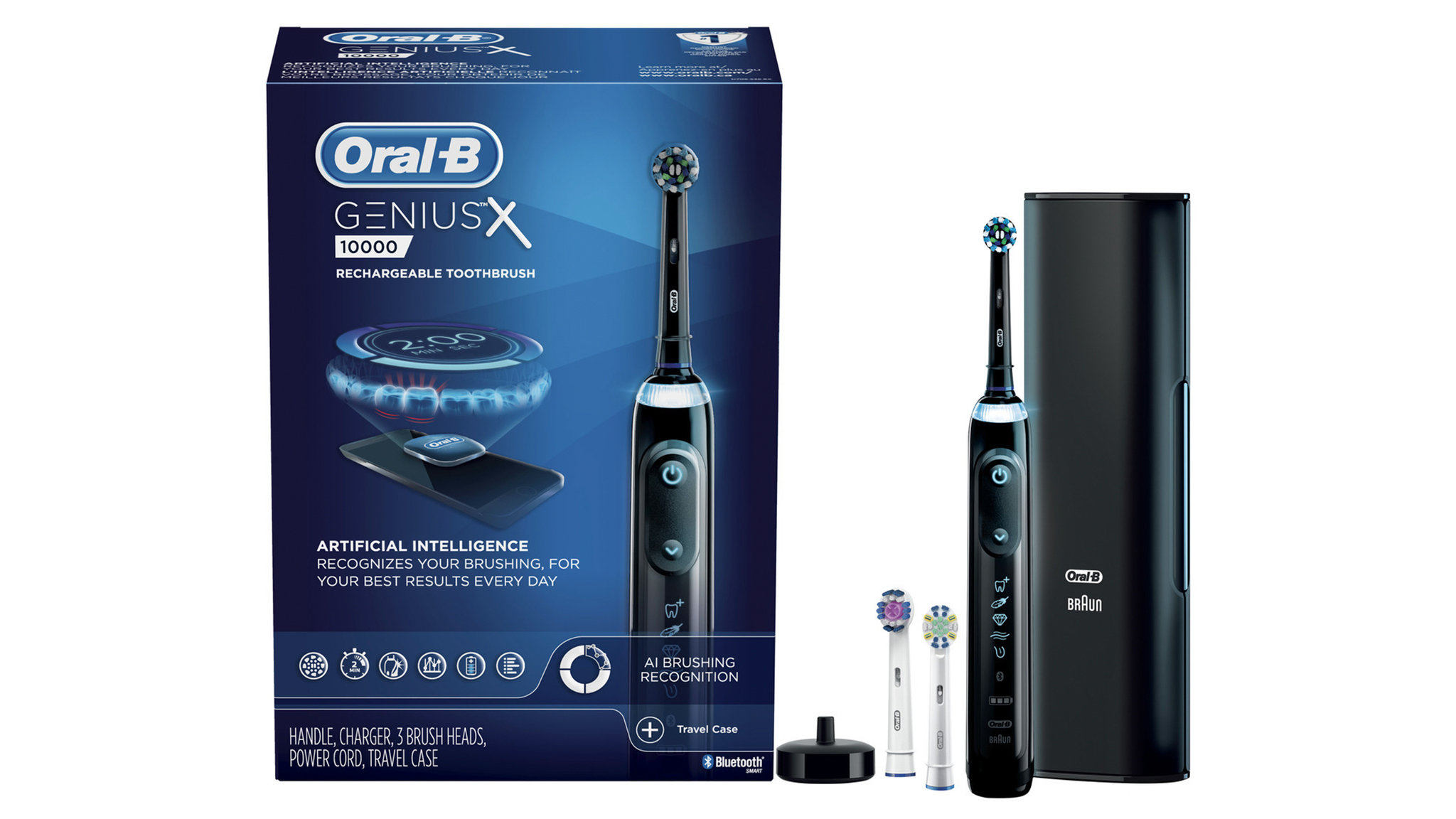
Oral-B Genius X 10000 Electric Toothbrush
Specifications
Reasons to buy
Reasons to avoid
With truly innovative tech and a slew of extensive research behind it, Oral-B’s 10000 Genius X goes above and beyond to provide you with the best possible experience you can get from a rotating-oscillating electric toothbrush.
There are six brushing modes on offer: Daily Clean, Pro Clean, Sensitive, Whitening, Gum Care and Tongue Clean. Those, plus a sensor to protect your gums if you apply too much pressure. This is hands-down the best Oral B electric toothbrush you can buy, as it uses artificial intelligence to recognize your brushing style.
It even connects, via Bluetooth, to the Oral-B app to analyze your brushing habits and give you feedback on how to improve your oral care, though you don’t have to use the app if you don’t want to.
While it’s fair to say not all the features will get used, even if you take away the fancy extras you are still left with a brilliant electric toothbrush that excels at cleaning away debris and plaque, and helps reduce staining.
While the added features mean the Oral-B 10000 Genius X comes at a premium price, the included USB charging case and three brush heads help seal the deal, especially when you consider each brush head lasts up to three months. The toothbrush’s handle can also be used with a wider range of brush heads beyond the three provided.
2. Gleem Rechargeable: Best electric toothbrush on a budget
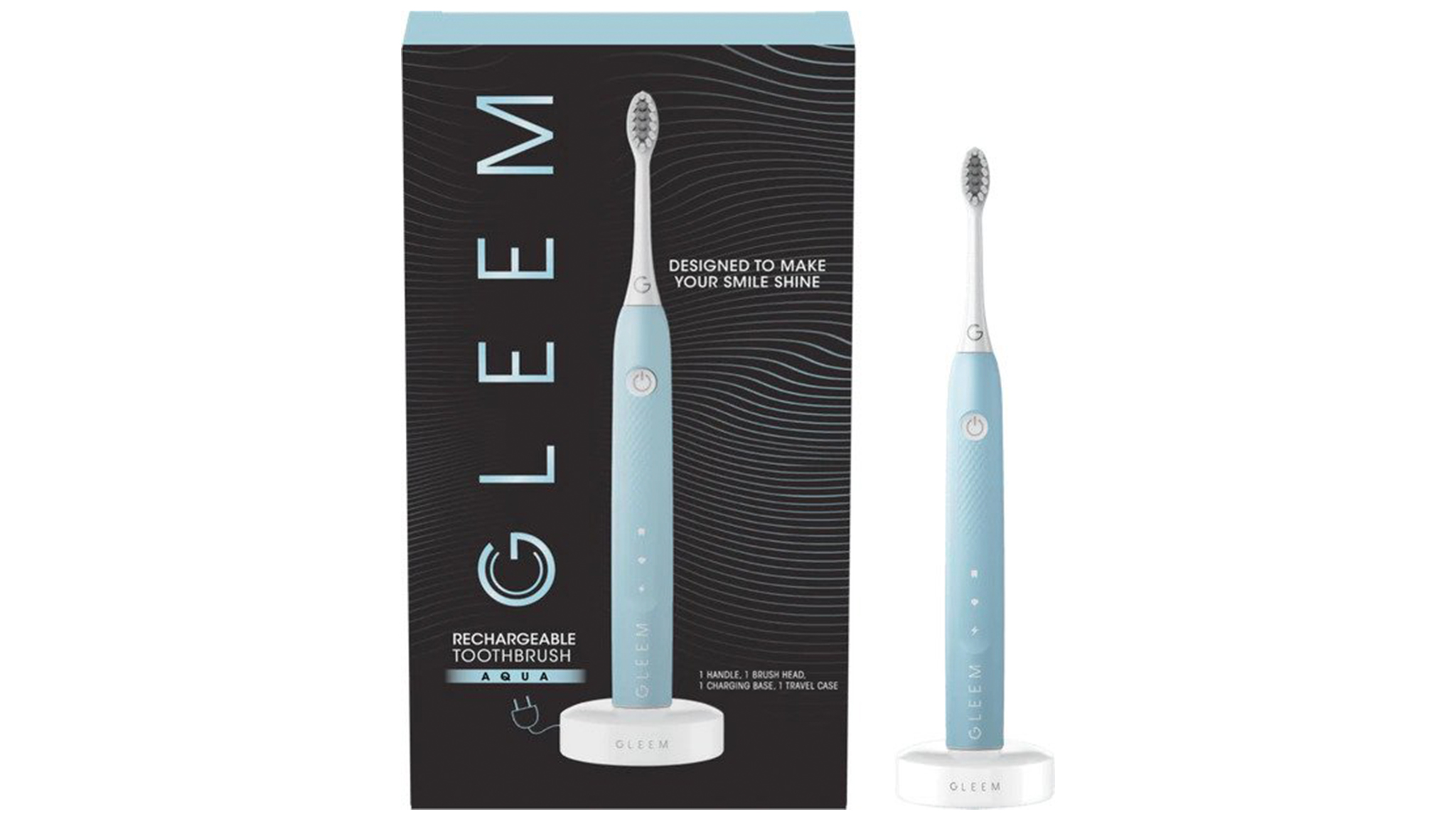
Gleem Rechargeable Electric Toothbrush
Specifications
Reasons to buy
Reasons to avoid
This smart and simple electric toothbrush gives you what you need for healthy teeth and gums, and doesn’t bother with any unnecessary frills. The rechargeable handle includes two modes: one standard, and one with a little extra power. These clean your teeth with sonic bristle vibrations. There’s also a built-in timer to keep your brushing on track.
The action of the brush is smooth and quiet, and, with only two options on offer, it’s straightforward to use. The Gleem Rechargeable Electric Toothbrush should also keep you brushing twice a day for two weeks before it’s time to charge it again.
Included are one brush head, one charging base and a basic travel case. The compact nylon brush replacements are inexpensive, so combined with the initial spend, this makes the Gleem a smart choice if you’re on a budget.
This cheap electric toothbrush might be low on fancy features, but it’s high on style, with a pleasingly streamlined handle and four colors to pick from: Coral, Aqua, Slate or Pearl.
3. Oral-B Kids: Best electric toothbrush for kids
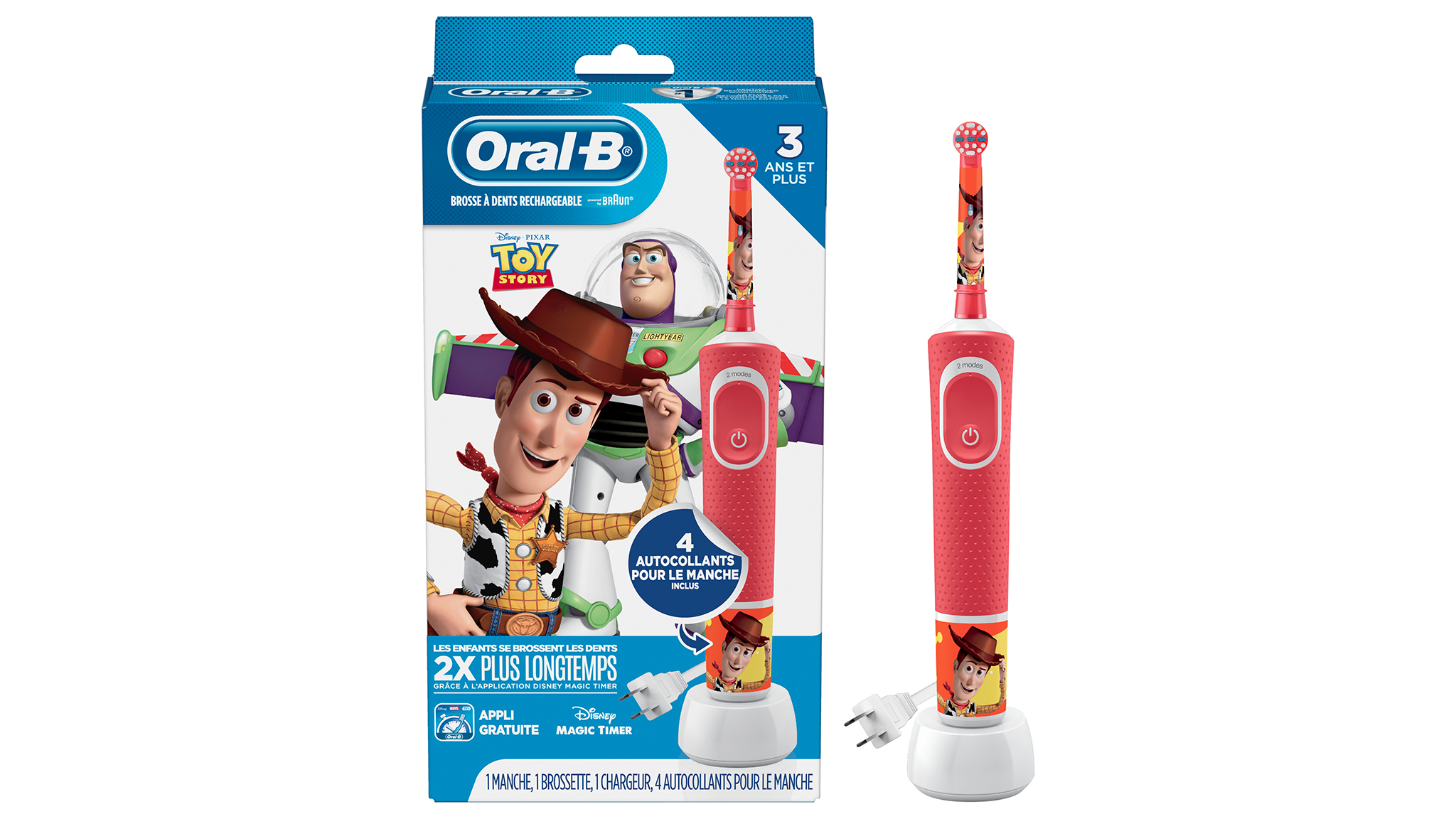
Oral-B Kids Electric Toothbrush
Specifications
Reasons to buy
Reasons to avoid
Because not all children have the manual dexterity (or patience) to thoroughly brush their teeth, this Oral-B electric toothbrush, aimed at kids aged 3 years or older, is designed to make light work of brushing.
The colorful Toy Story design and extra-soft brush head means it’s fun and easy to use, with a special gentle mode ideal for super-sensitive gums (or wobbly teeth).
The handle is nice and grippy and comes with a set of interchangeable stickers as a cool little touch. There is also an interactive Disney Magic Timer app so kids can brush along with their favorite characters. In addition to the fun stuff, there is a charger and brush head included, as well as a two-minute timer.
The small rotating brush head provides a thorough clean, but very young kids might find the handle a little bit too noisy.
4. Foreo ISSA 2
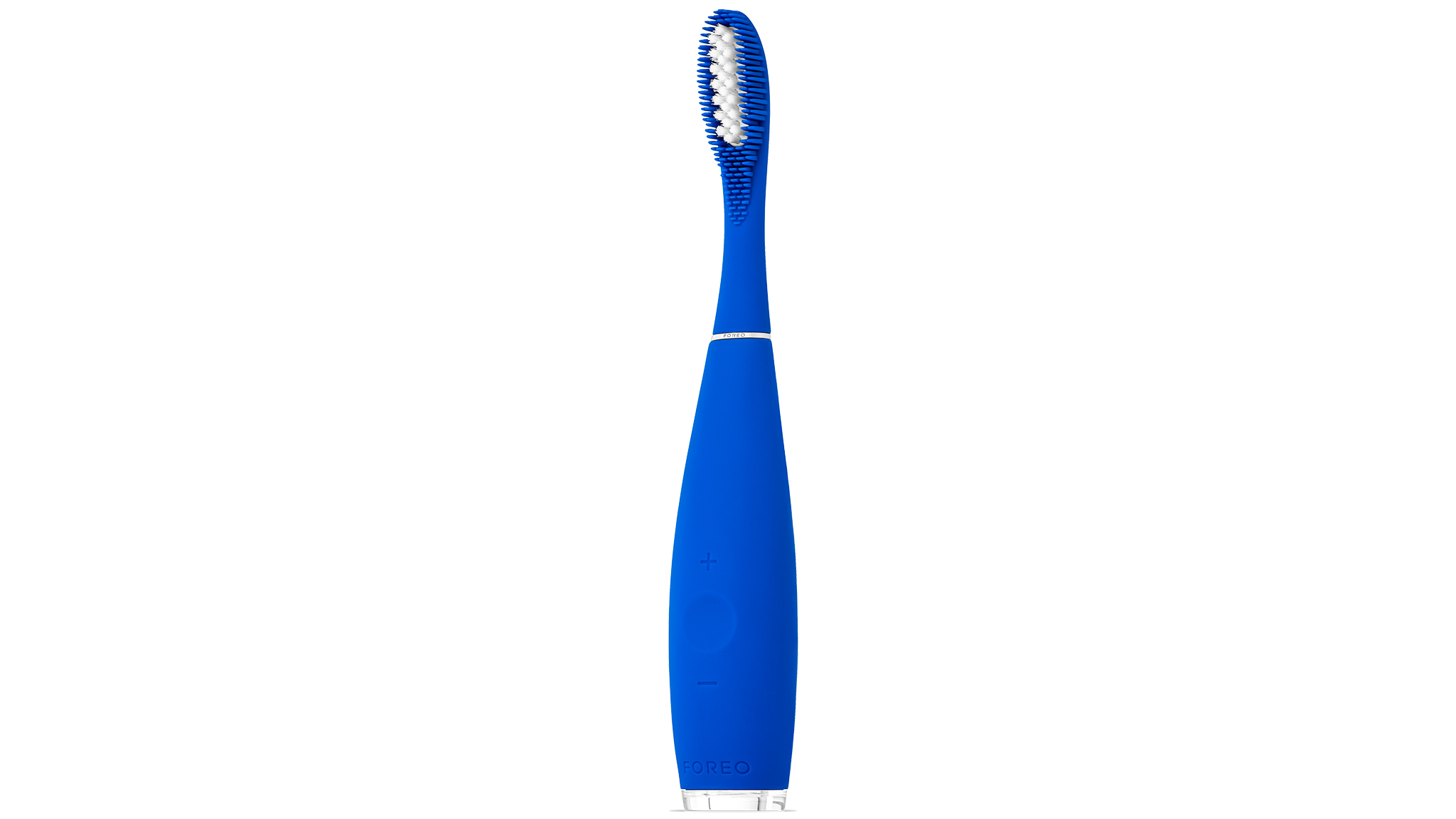
Specifications
Reasons to buy
Reasons to avoid
It’s always frustrating when your electric toothbrush runs out of charge halfway through a cleaning session, or, worse still, when you’re running late for work. While it’s a fact that rechargeable electric toothbrushes need to be topped up regularly, it’s always a bonus when you don’t have to do it very often.
The Foreo ISSA has an astonishing 12 months on a single charge – yes, you read that right – which will soon banish any frustrations associated with running low on battery.
With a sleek Swedish design and soft silicone brush, this medium-priced electric toothbrush is a joy to use. Add in the fact there are 16 intensity controls, and the brush only needs replacing once a year, then it’s fair to say this brush doesn’t do things by halves.
Also included is a charging port, USB charger and travel pouch. Brush head longevity is great, too, although this would be more impressive if the brush heads were cheaper to replace.
- Read our full Foreo ISSA 2 review
5. Waterpik Sonic-Fusion Flossing Toothbrush: Best for water flossing too
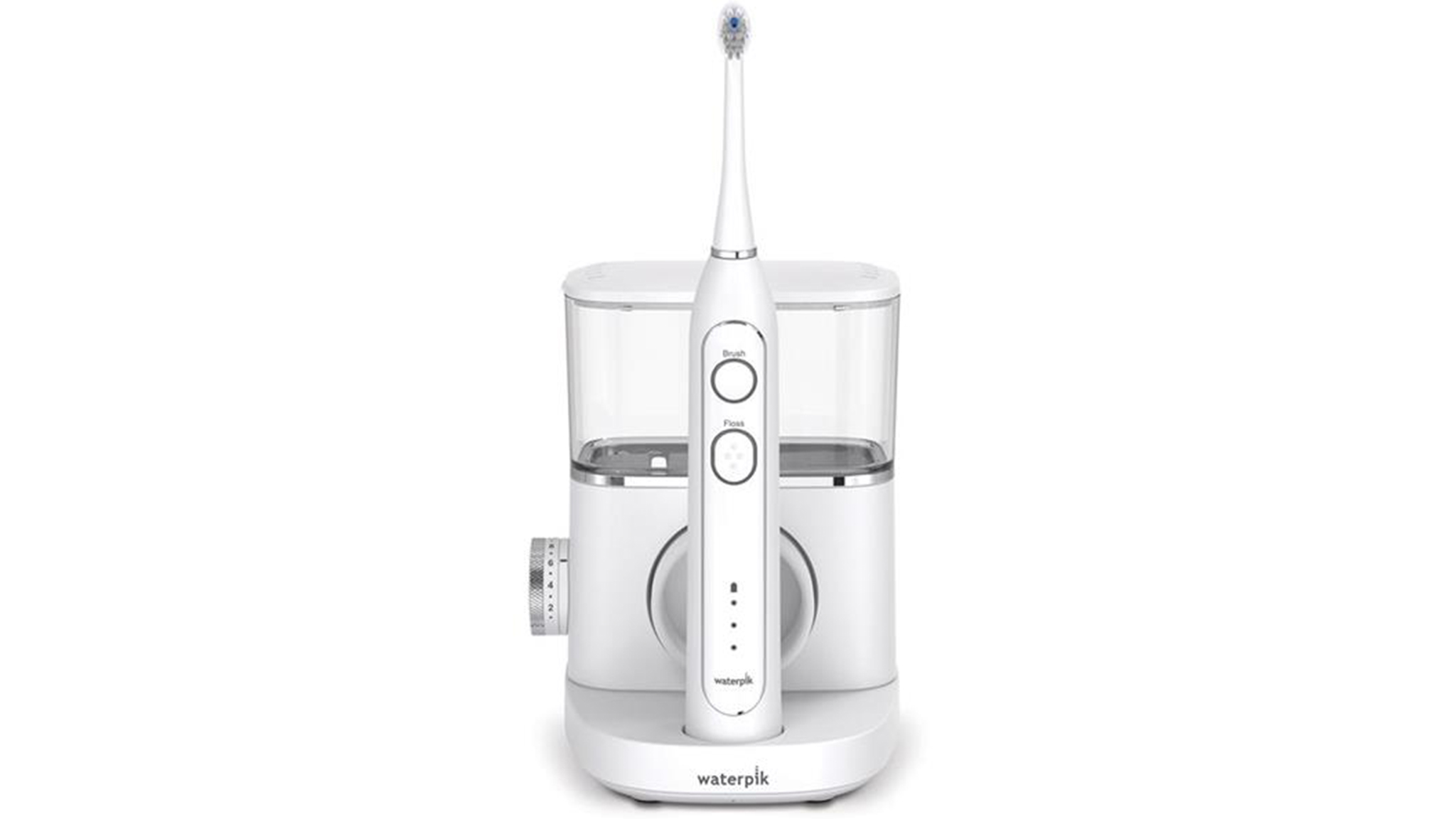
Waterpik Sonic-Fusion Flossing Toothbrush
Specifications
Reasons to buy
Reasons to avoid
Waterpik makes some of the best electric toothbrushes money can buy, and we love the Sonic-Fusion Flossing Toothbrush, as it really doubles down on your tooth and gum cleaning.
This particular electric toothbrush is designed to be used in addition to flossing your teeth, and could help to remove up to twice the amount of plaque compared to normal brushing and flossing alone.
Waterpik has designed it with three cleaning modes: Brush, Floss, or Brush and Floss. When flossing, it moves water between your teeth and below the gumline where the bristles on the toothbrush can’t reach. The water pressure can be controlled via ten different settings, depending on the level of cleaning you need.
It comes with one patented flossing brush head, plus a luxury toothbrush case for travel use. Oh, and the American Dental Association (ADA) like it too.
6. Oral-B Pro 1000: Best electric toothbrush for gum health
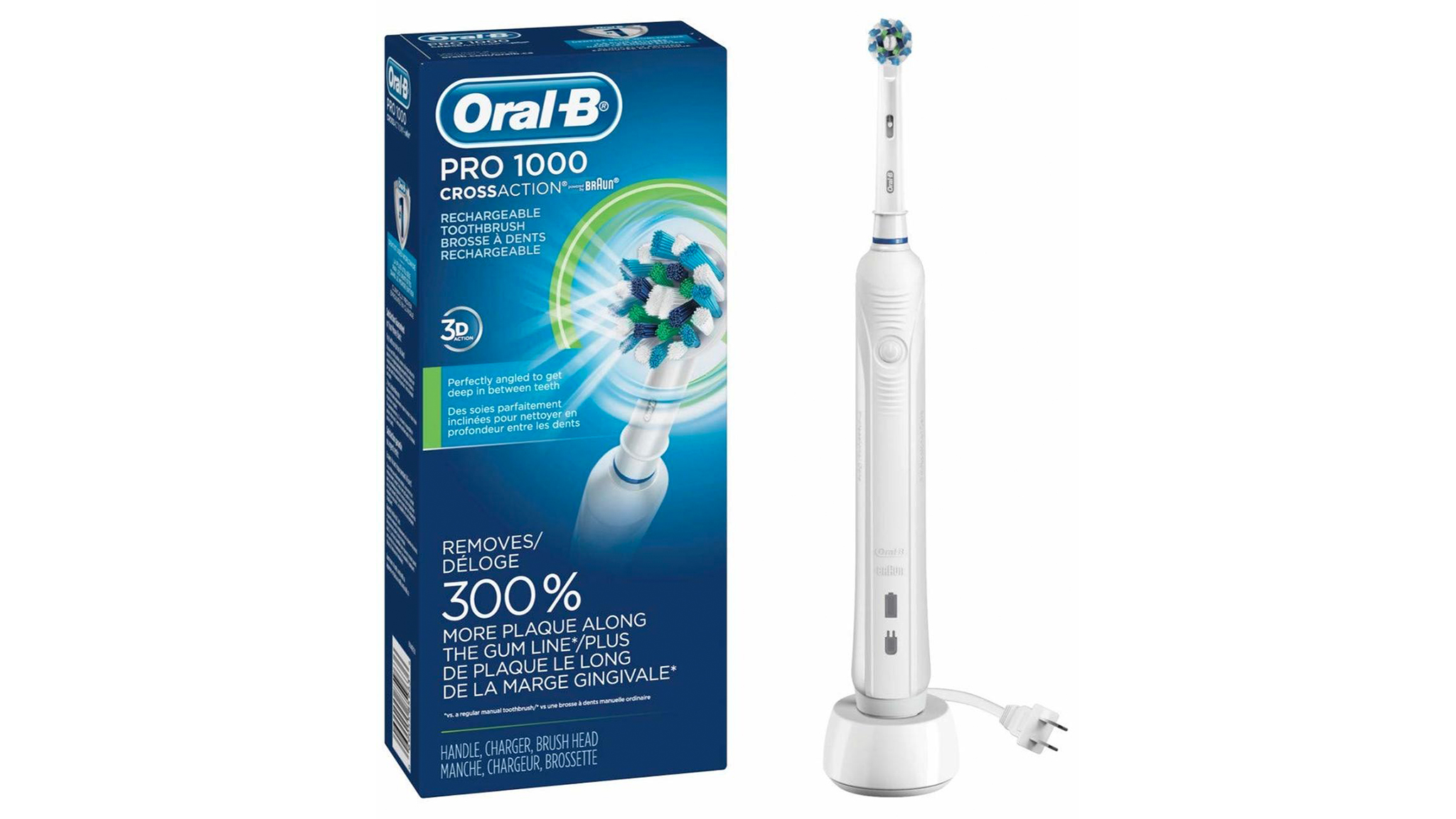
Specifications
Reasons to buy
Reasons to avoid
The Oral-B Pro 1000 rechargeable electric toothbrush is a great option when it comes to providing a really thorough clean. Included is a CrossAction brush head that not only rotates, but oscillates and pulsates, to remove plaque and keep your teeth shining.
And if all that sounds like it’s a bit too much, rest assured a pressure sensor will cut out the pulsation feature if you press too hard.
This brush only has one mode – Daily Clean – which, as the name suggests, provides a straightforward no-nonsense action. There is also a timer, for the standard recommended two minutes.
One of the biggest draws of this toothbrush though is its ability to fit a wide range of Oral-B replacement brush heads, so you can use heads with different functions such as ‘Floss Action’ and ‘3D White’. The handle itself is relatively inexpensive, which leaves you free to treat yourself to some of the fancier brush heads if you wanted to.
- Read our full Oral-B Pro 1000 review
7. Philips Sonicare DiamondClean Smart 9300: Best electric toothbrush for whitening
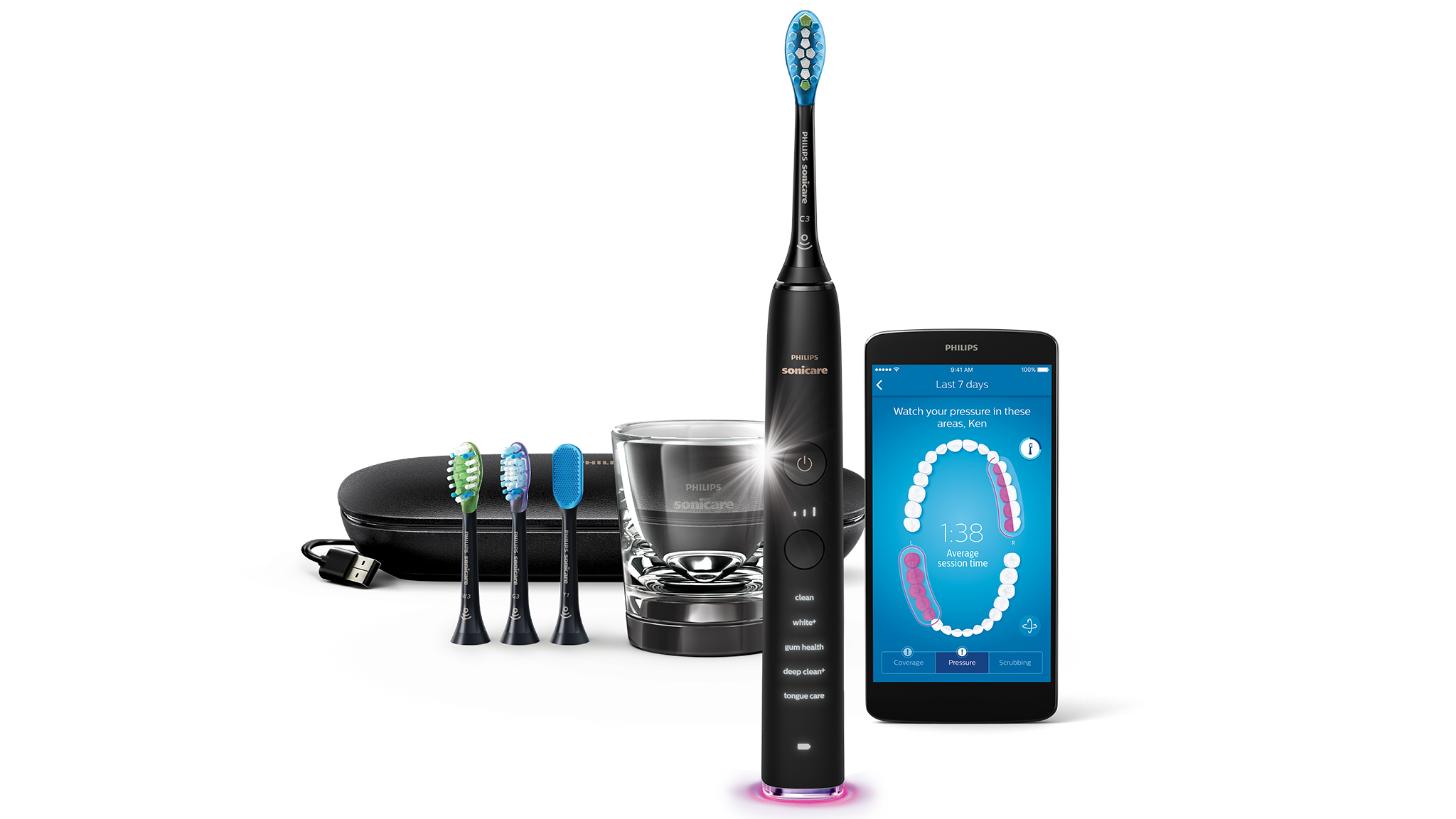
Specifications
Reasons to buy
Reasons to avoid
Philips claims its Sonicare DiamondClean Smart is 'the world’s most intelligent toothbrush' and to add to this buzz, it also delivers an impressively thorough clean.
The DiamondClean has sensors and a dedicated app to help you perfect your brushing technique. Also included is a stylish charging glass, as well as a deluxe travel case to keep your electric toothbrush fully protected.
The experience of using this sonic brush is undeniably smooth, and the ability to control the intensity (choose from High, Medium or Low) of the brush makes it ideal for even the most sensitive of gums, with cleaning modes that range from Clean to Deep Clean with options for White and Gum Health in the middle.
The Philips Sonicare DiamondClean Smart 9300 comes with three premium brush heads, which makes up a little for its higher price point. But, if you wanted to ramp things up even further, the DiamondClean Smart also comes in 9500 and 9700 versions that include extra features such as tongue care and USB charging – top-notch options that are great for your oral hygiene.
- Read our full Philips Sonicare DiamondClean Smart 9300 review
8. Philips Sonicare Protective Clean 5100
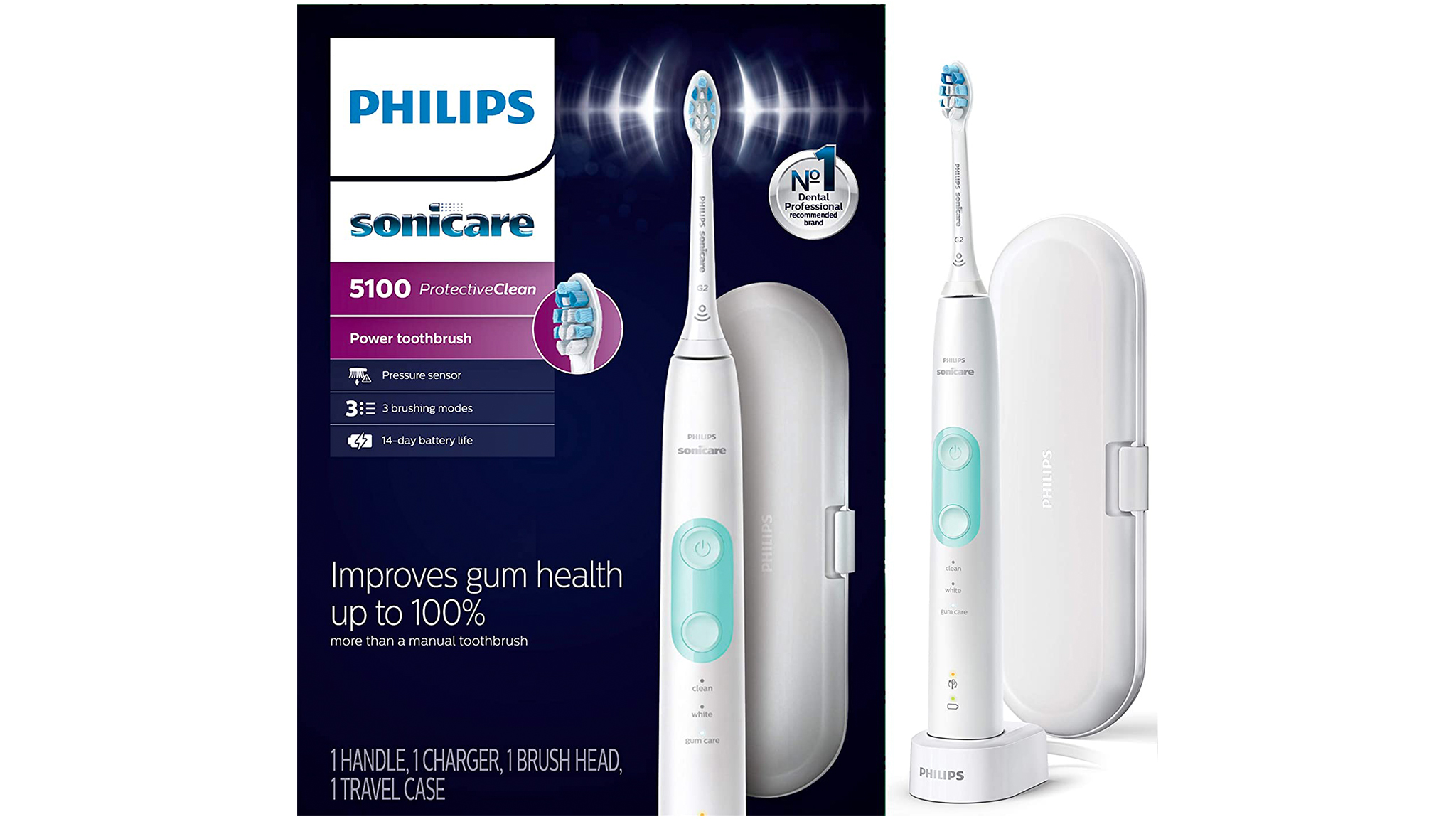
Specifications
Reasons to buy
Reasons to avoid
The Philips Sonicare ProtectiveClean 5100 is a reasonably priced electric toothbrush capable of cleaning your teeth and gums effectively, but without aggravating them. It has plenty of smart features to its name, include a pressure sensor that alerts you if you're brushing too hard.
One of our favorite features is the BrushSync Notification, which not only recognizes when you have fitted a new brush head, it also lets you know when it's time to change your brush head so that it's more effective at cleaning.
The number of accessories in the box is a little stingy compared to some of the more luxury models in our best electric toothbrushes line-up, and we particularly don't like the lack of a decent travel case with charging function, but overall there's enough here to justify the price
- Read our full Philips Sonicare ProtectiveClean 5100 review
Today's cheapest electric toothbrush prices
Best electric toothbrushes FAQ
How to choose the best electric toothbrush for you
Beyond the research and testing we conducted in our lab, we reached out to dentists and dental hygienists to learn what’s important to consider when you’re looking for an electric toothbrush. Dr James Doll, of Arizona School of Dentistry and Oral Health, advised the following...
"Talk to your dentist about your particular situation," he said. "If you’re more prone to gum recession, I’d suggest something that cleans well but is ultra-gentle to the gums. At the same time, some people may build up plaque or debris that is thicker or more difficult to remove, and a different brush may work better to get between the teeth or to remove difficult types of build-up.
"There are a number of excellent choices out there and a number of excellent brush heads. Asking your dentist or hygienist is always an excellent way to go."
How to use an electric toothbrush
If you’ve never used an electric toothbrush before, it could take a few days to get used to the cleaning movements – unlike a manual toothbrush it’s best to avoid any scrubbing motion, as this could irritate your gums. Simply hold the brush to your teeth and gently move it along the surface. It’s as easy as that.
The handle of your electric toothbrush should have a comfortable grip that feels steady in your hand. Meanwhile, the brush heads should be easy to swap, especially if you plan on sharing handles with another member of your household.
If you have specific needs for your toothbrushing, such as to accommodate dental issues, sensitive gums or orthodontic hardware, choosing an electric toothbrush with different cleaning modes will be helpful. But, if you just need a regular brushing routine, a single cleaning mode should work just fine.
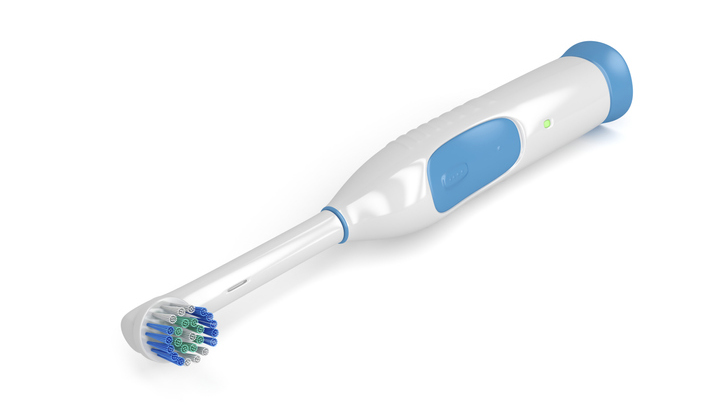
Higher end electric toothbrushes, including those from Philips Sonicare and Oral-B come with technology such as Bluetooth and downloadable apps – features that are reflected in the premium price. Other add-ons to consider include interdental brush heads, tongue cleaners, flossers, smartphone-integrated travel cases and rinsing glasses.
Electric toothbrushes vs manual toothbrushes
When choosing which electric toothbrush is right for you, it’s worth deciding beforehand which technology you prefer. Rotating-oscillating brushes clean your teeth by hugging each tooth in fast-rotating spins to ensure the surface is thoroughly covered.
Sonic wave toothbrushes, by contrast, use a brushing mechanism powered by high-frequency vibrations to clean your teeth. This action drives the water and toothpaste between the teeth to clean beyond where the bristles actually touch.
The American Dental Association has given specific toothbrushes with both these technologies its seal of approval. This accreditation means a product has passed lab tests and met standards to demonstrate that, based on the ADA’s guidelines, it "is safe and has shown efficacy in removing plaque and helping to prevent and reduce gingivitis, when used as directed."
As a result, you can feel confident that each technology is as effective as the other, leaving you to base your choice on personal preference. If you’re not sure which style is right for you, then both types of electric toothbrush have cheaper options to help you decide.
Either way, the biggest benefits of using an electric toothbrush over a manual toothbrush is more thorough and effective cleaning. Also look out for models with a built-in two-minute timer, as this is a sure-fire way to make sure you are getting your recommended quota of cleaning time.
Sign up to receive the latest news, reviews, buying guides and deals direct to your inbox
Freelancer writer and sub-editor Davina has over 20 years’ experience under her belt, and is one of our go-to writers for wellness content. From handheld massagers to mattresses, Davina has a keen interest in all things relaxation and rejuvenation, and spends a lot of her time covering these areas for Top Ten Reviews. So if you’re wondering which essential oil to use for easing stress, or whether a percussive massager really can banish your knotty muscles, Davina is the one to ask. When not working, she loves reading, practicing yoga and writing fiction.

